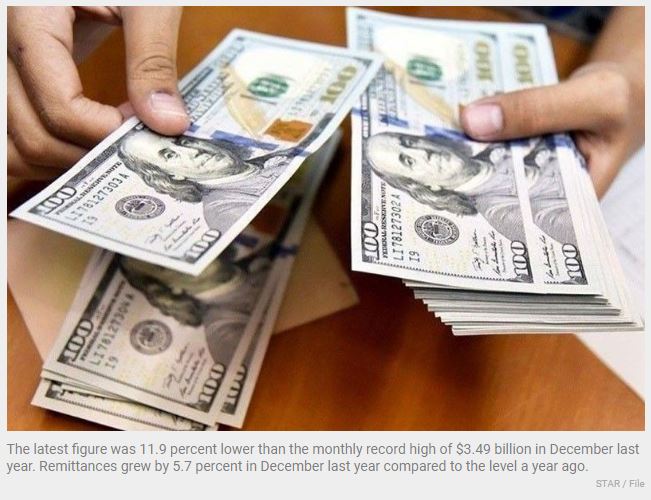Philippines: Rise in OFW remittances slows to 3.5% in January
MANILA, Philippines — Personal remittances from overseas Filipino workers (OFWs) grew by only 3.5 percent to $3.07 billion in January from $2.97 billion in the same period last year, according to the Bangko Sentral ng Pilipinas (BSP).
The latest figure was 11.9 percent lower than the monthly record high of $3.49 billion in December last year. Remittances grew by 5.7 percent in December last year compared to the level a year ago.
Personal remittances are the sum of net compensation of employees, personal transfers, and capital transfers between households. Personal transfers consist of all current transfers in cash or in kind made or received by resident households to or from non-resident households.
Likewise, cash remittances coursed through banks went up by 3.5 percent to $2.76 billion in January from $2.67 billion a year ago. The amount, however, was 3.5 percent lower than the monthly record high of $3.16 billion recorded in December last year.
“The growth in cash remittances from the US, Saudi Arabia, Japan and Singapore contributed largely to the increase in remittances in January 2023,” the BSP said.
The United States emerged as the major source of remittances with a share of 41.9 percent followed by Singapore’s 7.2 percent, Japan’s 5.9 percent, Saudi Arabia’s 5.9 percent, United Kingdom’s 4.8 percent, United Arab Emirates’ 3.2 percent, Canada’s 3.2 percent, Taiwan’s 2.7 percent, Qatar’s 2.7 percent and Malaysia’s 2.5 percent.
OFW remittances usually pick up during the start of the so-called ‘ber months from October to December as Filipinos abroad send home more money during the Christmas holidays.
Michael Ricafort, chief economist at Rizal Commercial Banking Corp., attributed the continued increase in remittances to the pent-up demand and revenge spending as the country recovers from the impact of the COVID-19 pandemic.
“Increased spending even after December, with no more COVID restrictions compared to 2020-2021, in terms of more spending by consumers on shopping, eating out, travel, other essentials and non-essentials, among other business activities fundamentally led to more OFW remittances sent to the country,” Ricafort said.
Ricafort also cited the recovery of the peso against the dollar after slumping by as much as 15.7 percent to an all-time low of 59 to $1 in October last year.
The peso has bounced back to the 53 to $1 level as the BSP aggressively raised key policy rates to maintain a healthy interest rate differential after the US Federal Reserve hiked interest rates to tame inflation as well as the central bank’s active intervention in the foreign exchange market.
According to Ricafort, OFWs are still somewhat encouraged to send and convert more remittances to pesos even after the holiday season.
“The sending of more OFW remittances is also needed to cope with higher inflation locally, but this is offset by the fact that similarly higher prices in host countries could have also increased the cost of living of OFWs abroad, and thereby could have been a drag on the amount of remittances sent to the country,” Ricafort said.
He said an offsetting risk factor is a possible recession in the US that could slow down remittances amid slower global trade, foreign direct investments (FDI), employment and other economic activities.
“Nevertheless, the sustained year-on-year growth in OFW remittances in recent months may also reflect faster economic recovery in some major host countries around the world that has enabled more OFWs to work again, especially in countries with increased COVID booster shot rollouts that helped reduce new cases and moving towards greater economic normalcy,” he said.
The BSP missed its four percent growth target for the second straight year as remittances increased by only 3.6 percent.
Personal remittances reached an all-time high of $36.14 billion in 2022 from $34.88 billion in 2021, of which cash remittances coursed through banks amounted to a record high of 32.54 billion from $31.42 billion.
For 2023, the BSP sees both personal and cash remittances climbing by four percent.
Source: https://www.philstar.com/business/2023/03/16/2252093/rise-ofw-remittances-slows-35-january


 Thailand
Thailand




